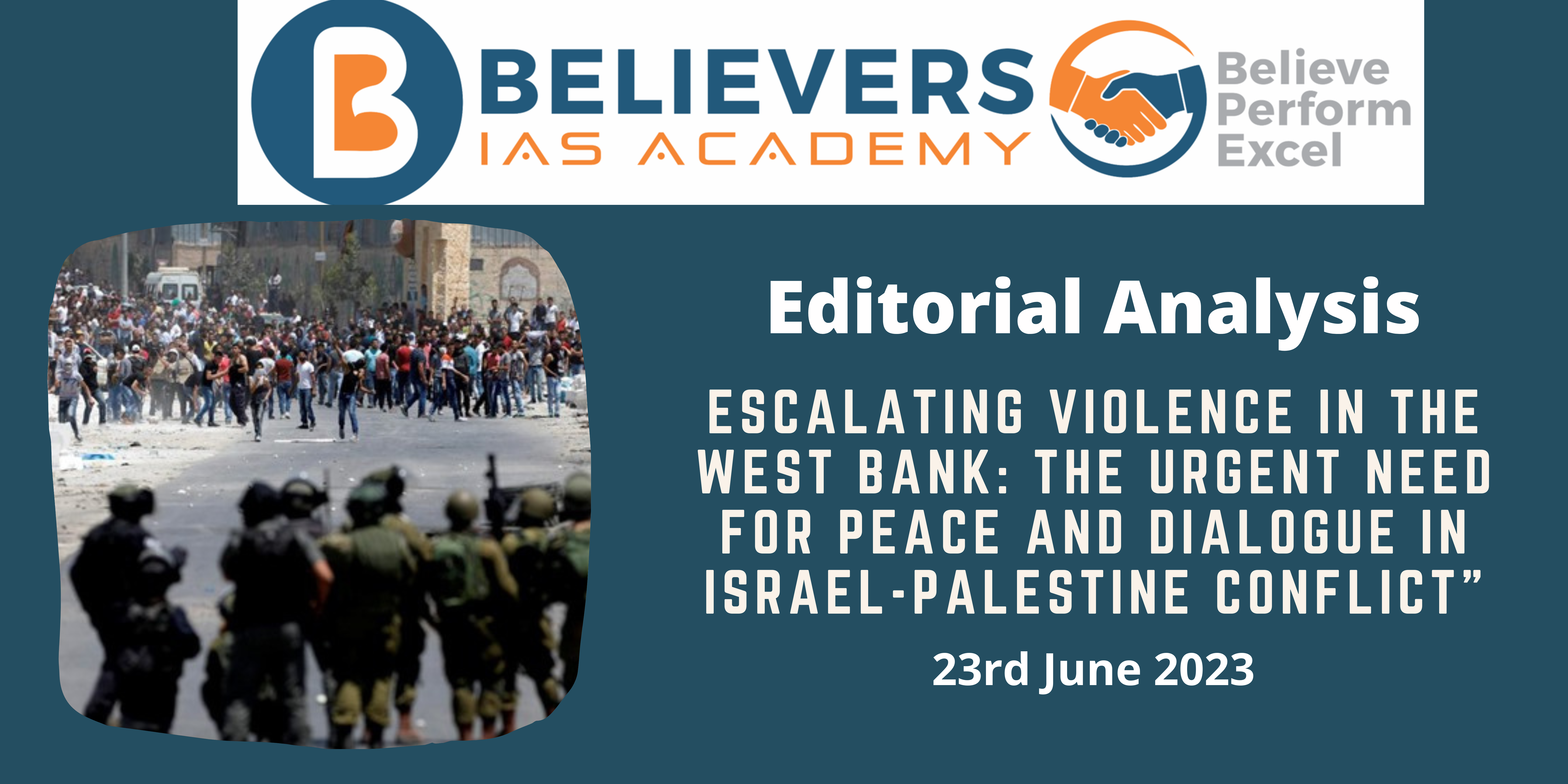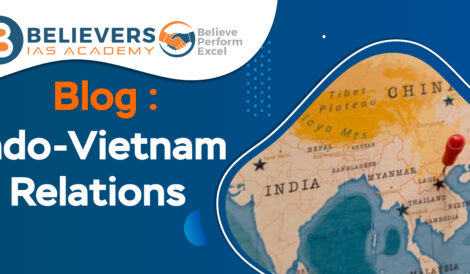Escalating Violence in the West Bank: The Urgent Need for Peace and Dialogue in Israel-Palestine Conflict”
Context:
- The spiraling violence in the occupied West Bank between Israelis and Palestinians.
- It highlights recent incidents of violence, including Israeli raids, gun attacks, and settler rampages, which have escalated tensions in the region.
Relevance:
General Studies Paper-II: International Relations
General Studies Paper-III: Security challenges and their management
Prelims:
- Geography of Israel & Palestine.
- Arab Israel war of 1948.
- Abraham Accord.
- Jerusalem’s al-Aqsa Mosque
Mains questions:
- Reflecting on the Israeli-Palestinian conflict, critically analyze the role of political, socio-economic, and historical factors in perpetuating violence and hindering the peace process. What broader lessons can be drawn from this conflict for conflict resolution and peacebuilding efforts worldwide? (250 words)
- Discuss the role of international actors in resolving the Israeli-Palestinian conflict and suggest possible measures to de-escalate tensions and promote peace. (150 words)
Israel and Palestine:
- Historical Context: The conflict between Israel and Palestine dates back to the early 20th century, rooted in competing national aspirations and claims to the same land.
- Creation of Israel: The establishment of the State of Israel in 1948 led to the displacement of hundreds of thousands of Palestinians, resulting in a large refugee population and fueling Palestinian grievances.
- Occupied Territories: Israel’s occupation of the West Bank, including East Jerusalem, and the Gaza Strip since the 1967 Arab-Israeli war has been a major point of contention, with Palestinians demanding self-determination and an end to occupation.
- Israeli Settlements: The expansion of Israeli settlements in the occupied territories has been a significant obstacle to peace, as they are considered illegal under international law and undermine the viability of a future Palestinian state.
- Status of Jerusalem: Both Israel and Palestine claim Jerusalem as their capital, leading to disputes over control and sovereignty. The issue of Jerusalem remains a major stumbling block in peace negotiations.
- Security Concerns: Israel cites security concerns, including acts of terrorism, as a justification for its military presence and restrictions on movement in the occupied territories. Palestinians argue that these measures infringe upon their rights and hinder their daily lives.
- Gaza Blockade: Israel’s blockade of the Gaza Strip, which has been in place since 2007, severely restricts the movement of goods and people, exacerbating the humanitarian situation and contributing to tensions.
- Internal Palestinian Divisions: Political divisions between Fatah, which controls the West Bank, and Hamas, which governs Gaza, have hindered Palestinian unity and created challenges for negotiations with Israel.
- International Peace Efforts: Numerous international initiatives, including the Oslo Accords, the Quartet on the Middle East, and the United Nations resolutions, have sought to facilitate a negotiated solution but have yet to yield a lasting peace agreement.
- Regional and Global Implications: The Israeli-Palestinian conflict has wider regional and global implications, impacting stability in the Middle East and influencing international relations. It also intersects with issues such as terrorism, refugee crises, and religious tensions.
Dimensions to the article:
- Escalation of Violence in the West Bank
- Root Causes and Implications:
- Role of India and Way Forward
Escalation of Violence in the West Bank:
- The recent surge in violence in the West Bank, characterized by Israeli raids and Palestinian attacks, has significant implications for regional stability and the peace process.
- The Israeli settlements, which continue to expand in the occupied territories, have been a major point of contention. These settlements are considered illegal under international law and undermine the prospects of a two-state solution.
- The frustration and sense of injustice among Palestinians have given rise to local resistance groups, such as the Jenin Brigade, resorting to low-tech attacks against Israeli soldiers and settlers. This represents a shift from isolated knife attacks to more organized and coordinated acts of violence.
- The Israeli government’s retaliatory measures, including demolishing houses and launching airstrikes, not only escalate the violence but also breed resentment among Palestinians, fueling further acts of aggression.
Root Causes and Implications:
- The failure to achieve a lasting political solution and address the core issues, such as the status of Jerusalem, borders, and the right of return for Palestinian refugees, has contributed to the perpetuation of the conflict.
- The expansion of Israeli settlements undermines the viability of a future Palestinian state, as it encroaches upon Palestinian territories and restricts their access to resources.
- The political divisions among Palestinian factions, with Fatah controlling the West Bank and Hamas ruling Gaza, further complicate efforts to achieve unity and negotiate effectively with Israel.
- The lack of meaningful international intervention and pressure on Israel to halt settlement expansion and abide by international law has allowed the situation to deteriorate.
- The sustained violence not only poses a threat to the lives and security of both Israelis and Palestinians but also perpetuates a cycle of hatred and revenge, hindering the prospects for lasting peace and stability in the region.
Way Forward:
- International actors, including the United States, European Union, and Arab states, should play a more proactive role in mediating the conflict, putting pressure on Israel to freeze settlements and encouraging both sides to return to the negotiating table.
- Revitalizing diplomatic efforts through multilateral forums such as the United Nations and the Quartet on the Middle East can provide a platform for meaningful dialogue and negotiations.
- Confidence-building measures, such as easing restrictions on the movement of goods and people, improving access to basic services, and promoting economic development, can help address the underlying grievances and foster an atmosphere of trust.
- Civil society organizations, peace-building initiatives, and Track II diplomacy should be supported to facilitate people-to-people contact, cultural exchange, and grassroots dialogue between Israelis and Palestinians.
- Regional cooperation and engagement, including the involvement of neighboring Arab states, can provide additional support and incentives for peacebuilding efforts.
Role of India and Way Forward:
- India, as a non-permanent member of the United Nations Security Council and a prominent actor in the global arena, should actively engage in efforts to resolve the Israeli-Palestinian conflict.
- India’s historical support for the Palestinian cause and its balanced approach in engaging with both Israelis and Palestinians positions it as a credible mediator.
- India can leverage its diplomatic relations with Israel, Palestine, and other key stakeholders to facilitate dialogue, encourage confidence-building measures, and promote a just and lasting solution based on the principles of international law and relevant UN resolutions.
- India can also contribute to the socio-economic development of the Palestinian territories through capacity-building initiatives, investment in infrastructure projects, and humanitarian assistance, thereby addressing the underlying grievances and fostering a conducive environment for peace.




